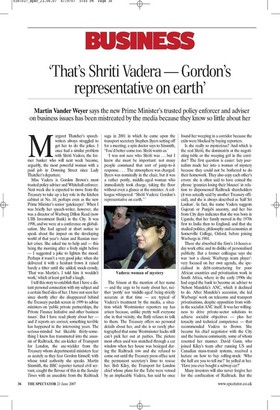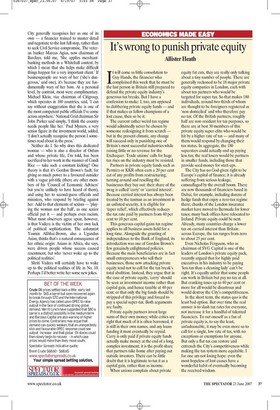'That's Shriti Vadera — Gordon's representative on earth'
Martin Vander Weyer says the new Prime Minister's trusted policy enforcer and adviser on business issues has been mistreated by the media because they know so little about her Margaret Thatcher's speechwriters always struggled to get her to do the jokes. I once had a similar problem with Shriti Vadera, the former banker who will next week become, arguably, the most powerful woman with a paid job in Downing Street since Lady Thatcher's departure.
Miss Vadera is Gordon Brown's most trusted policy adviser and Whitehall enforcer. Next week she is expected to move from the Treasury to take up a key role in the kitchen cabinet at No. 10, perhaps even as the new Prime Minister's senior 'gatekeeper'. When I was briefly her speech-writer, however, she was a director of Warburg Dillon Read (now UBS Investment Bank) in the City. It was 1998, and we were at a conference on globalisation. She had agreed at short notice to speak about the impact on the developing world of that year's Asian and Russian market crises. She asked me to help and — this being the morning after a lively night before — I suggested a joke to lighten the mood. Perhaps it wasn't a very good joke: when she delivered it with a hesitant frown it raised barely a titter until she added, mock-crossly, 'That was Martin's. I told him it wouldn't work,' which at least got half a laugh.
I tell this story to establish that I have a distant personal connection with my subject and a certain fixed idea of her. I have not seen her since shortly after she disappeared behind the Treasury purdah screen in 1999 to advise ministers on 'public private partnerships, the Private Finance Initiative and other business issues'. But I have read plenty about her — and if reports are correct, something terrible has happened in the intervening years. The serious-minded but likeable thirty-something I knew has transmuted into the assassin of Railtrack, the ass-kicker of Transport for London, the axe-wielder from the Treasury whom departmental ministers fear as acutely as they fear Gordon himself, with whose total authority she speaks. Martin Sixsmith, the BBC reporter turned civil servant, caught the flavour of this in the Sunday Times with an anecdote from the Railtrack saga in 2001 in which he came upon the transport secretary Stephen Byers setting off for a meeting; a spin doctor says to Sixsmith, 'You'd better come too. Shriti wants us.'
'I was not sure who Shriti was . .. but I knew she must be important: not many people command that sort of jump-to-it response.... The atmosphere was charged. Byers was nominally in the chair, but it was a rather portly, middle-aged woman who immediately took charge, taking the floor without even a glance at the minister A colleague whispered: "Shriti Vadera: Gordon's representative on earth."' The frisson at the mention of her name — and the urge to be nasty about her, neither 'portly' nor 'middle-aged' being strictly accurate at that time — are typical of Vadera's treatment by the media, a situation which Westminster reporters say has arisen because, unlike pretty well everyone else in that vicinity, she flatly refuses to talk to them. The Treasury offers no personal details about her, and she is so rarely photographed that some Westminster hacks still can't pick her out at parties. The picture most often used was snatched through a car window when her house was besieged during the Railtrack row and she refused to come out until the Treasury press office sent the permanent secretary's limo to rescue her. Bob Kiley, the Transport for London chief whose plans for the Tube were vetoed by an implacable Vadera, has said he once found her weeping in a corridor because the exits were blocked by baying reporters.
Is she really so mysterious? And which is the real Shriti, the dominatrix at the negotiating table or the weeping girl in the corridor? The first question is easier: lazy journalists made her into a woman of mystery because they could not be bothered to do their homework. They also copy each other's errors: she is often said to have coined the phrase 'grannies losing their blouses' in relation to dispossessed Railtrack shareholders (it was actually said by another Treasury official), and she is always described as 'half Sri Lankan' In fact, the name Vadera suggests Gujerati or Punjabi ancestry, and her bio from City days indicates that she was born in Uganda, that her family moved in the 1970s first to India then to England, and that she studied politics, philosophy and economics at Somerville College, Oxford, before joining Warburgs in 1984.
There she absorbed the firm's 14-hours-aday work ethic and its dislike of personalised publicity. But a former colleague says she was 'not a classic Warburgs team player': very focused on her own agenda, she specialised in debt-restructuring for poor African countries and privatisation work in South Africa, where in the early 1990s she had urged the bank to become an adviser to Nelson Mandela's ANC, which it declined to do. After Mandela's accession, she led Warburgs' work on telecoms and transport privatisations, despite opposition from within the socialist ANC itself. It was her willingness to drive private-sector solutions to achieve socialist objectives — plus her tenacity and technical competence — that recommended Vadera to Brown. She became his chief negotiator with the City and the business community, some of whom resented her manner. David Gunn, who joined Kiley's team after running US and Canadian mass-transit systems, received a lecture on how to buy rolling-stock: 'Who the hell are you to tell me?' he yelled at her. 'Have you ever bought a subway car?'
Many investors will also never forgive her for the confiscation of Railtrack. But the City generally recognises her as one of its own — a financier trained to master detail and negotiate to the last full stop, rather than to seek Civil Service compromise. The veteran banker Marcus Agius, now chairman of Barclays, told me, 'She applies merchantbanking methods in a Whitehall context, by which I mean that she helps make difficult things happen for a very important client.' If businesspeople are wary of her (she's dangerous,' said one), it's because they are fundamentally wary of her boss. At a personal level, by contrast, most were complimentary. Michael Klein, vice chairman of Citigroup, which operates in 100 countries, said, 'I can say without exaggeration that she is one of the most competent public officials I've come across anywhere.' National Grid chairman Sir John Parker said simply, 'I think the country needs people like her.' Paul Myners, a very senior figure in the investment world, added, 'I don't actually recognise the person I sometimes read about in the press.'
Neither do I. So why does this dedicated woman — who is also a director of Oxfam and whose private life, I'm told, has been sacrificed to her work in the manner of Condi Rice — take such a constant kicking? One theory is that it's Gordon Brown's fault, for giving so much power to a favoured outsider with a vague job-title (there are other members of his 'Council of Economic Advisers' but you're unlikely to have heard of them), and using her to second-guess officials and ministers, who respond by briefing against her. Add to that elements of sexism — 'playing the woman not the ball', as one senior official put it — and perhaps even racism. What most observers agree upon, however, is that Vadera is the victim of her own lack of political sophistication. The columnist Yasmin Alibhai-Brown, also a Ugandan Asian, thinks that's a natural consequence of her ethnic origin: Asians in Africa, she says, were driven people whose success caused resentment, but who 'never woke up to the political realities'.
Shriti Vadera will certainly have to wake up to the political realities of life in No. 10. Perhaps I'd better write her some new jokes.






























































 Previous page
Previous page